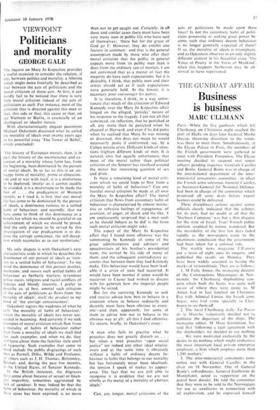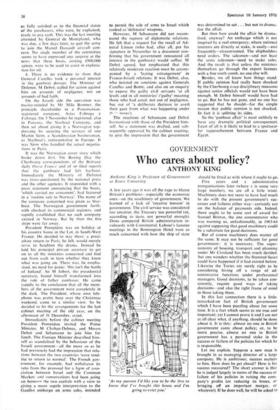THE GUNBOAT AFFAIR
Business is business
MARC ULLMANN
Paris—When the five gunboats which left Cherbourg on Christmas night reached the port of Haifa six days later Gcneral Moshe Dayan, throwing discretion to the winds, was there to meet them. Simultaneously, at the Elysee Palace in Paris, the members of the French government were gathered to meet with President Pompidou. The Elysee meeting decided to suspend two senior officers pending inquiries: Generals Cazelles and Bonte. General Bonte was in charge of the international department of the inter- ministerial armaments committee—in effect the French arms salesman. General C'azelks, as Secretary-General for National Defence, had been in charge of the committee which processed all arms deals before export licences could be delivered.
These disciplinary actions against senior officials clearly indicated that the cabinet. for its part, had no doubt at all that the `Starboat Company' was but a thin disguise for the state of Israel. True? French public opinion, sceptical by nature, wondered. But the incredulity of the first few days faded rapidly as the newspapers came to the unanimous conclusion that the government had been taken for a colossal ride.
The weekly news magazine L'Express put a team of eight onto its enquiry, and published the results on Monday. They have been widely accepted as having the marks of verisimilitude. They arc as follows:
I. M Felix Amiot. the managing director of the Constructions Mecaniques de Nor- mandie. the Cherbourg shipbuilding con- cern m hich built the boats, was quite well aware of where they were going to. M Amiot had in fact lunched on Christmas Eve with Admiral Limon, the Israeli arms buyer, who had come specially to Cher- bourg to see them off.
2. The local Cherbourg daily, La Presse de la Manche, voluntarily decided not to publicise the departure of the ships. The managing editor, M Marc Gustiniani, has said that 'following a tacit agreement with the shipbuilders we decided to say nothing . . . We were motivated exclusively by the desire to do nothing which might embarrass the most important local private enterprise employer, a firm which employs more than 1,200 workers.'
3. The inter-ministerial armaments com- mittee met with General Cannes in the chair on 18 November. One of General Bonte's subordinates, General Guillcmin de Montplanet, acted as rapporteur on the patrol boat dossier. He told the committee that they were to be sold to the Norwegians for use as auxiliaries in connection with oil exploration, and he expressed himself
as fully satisfied, as to the financial status of the purchasers, who were, he explained, ready to pay cash. This was the last meeting attended by General de Montplanet, who was due, a few days later, to quit the army to join the Marcel Dassault aircraft con- cern. No single member of the committee seems to have expressed any surprise at the news that these boats, costing £900,000 apiece, were to be used to assist in explora- tion for oil.
4. There is no evidence to show that General Cazelles took a personal interest in the gunboat dossier. The Minister of Defence, M Debi* called for action against him on grounds of negligence, not on grounds of bad faith.
On the Israeli side the operation was master-minded by Mr Mila Brenner, the principle shareholder in a Panamanian- registered company, Arias Fabrega y Fabrega. On 5 November he registered, also in Panama, the Starboat Company, and then set about giving it a Norwegian top- dressing by securing the services of one Martin Siem, a Scandinavian businessman, as Starboat's representative in Europe. It was Siem who handled the actual negotia- tions in Paris.
It was the Norwegian cover story which broke down first. On Boxing Day the Cherbourg correspondents of the Brittany daily Guest France and of AP filed reports that the gunboats had left harbour. Immediately the Ministry of Defence was cross-questioned by the national press and the other agencies. It responded with a press statement announcing that the boats, 'which carried no armament', had featured in a 'routine sale to Norway'. The name of the company concerned was given as Star- boat. The Norwegian government forth- with checked its commercial registers, and rapidly established that no such company existed in Norway. But by then the five ships were far away.
President Pompidou was on holiday at his country home in the Lot, in South-West France. He decided to stay there: a preci- pitate return to Paris, he felt, would merely serve to heighten the drama. Instead he told his principal private secretary to get on to all the ministers concerned and find out from each in turn whether they knew what was going on. There was, he empha- sised, no need for panic: 'this isn't the battle of Jutland'. So M Jobert, the presidential secretary, found himself transformed into the role of father confessor. He came rapidly to the conclusion that all the mem- bers of the government were completely in the dark. The President, whose own tele- phone was pretty busy over the Christmas weekend, came to a similar view. So he decided to let the arrangements for the last cabinet meeting of the old year, on the afternoon of 31 December, stand.
Immediately before the cabinet meeting President Pompidou invited the Prime Minister, M Chaban-Delmas, and Messrs Debre and Schumann to join him for lunch. The Foreign Minister described him- self as scandalised by the behaviour of the Israeli government—all the more so as he had previously had the impression that rela- tions between the two countries 'were tend- ing to return to normal'. The French gov- ernment, for example, had withdrawn its veto from the pronosal for a firm of asso- ciation between Israel and the Common Market; and conversations had been going on between the two capitals with a view to giving a more supple interpretation to the Gaullist embargo on arms sales, intended to permit the sale of arms to Israel which ranked as 'defensive' weapons.
However, M Schumann did not recom- mend the rupture of diplomatic relations. He felt that a request for the recall of Ad- miral Limon (who had, after all, put his signature in November to a document con- firming that his government renounced all interest in the gunboats) would suffice. M Debre agreed, but emphasised that this relatively moderate reaction must be accom- panied by a 'lasting estrangement' in Franco-Israeli relations. It was Debt* also, who insisted on sanctions against Generals Cazelles and Bonte, and also on an enquiry to expose the guilty civil servants 'at all levels and in all ministries' ('guilty' meaning those who had acted, not out of negligence, but out of 'a deliberate decision to avert their gaze from what was happening under nows').
The reactions of Schumann and Debre harmonised with those of the President him- self. So a statement was drafted, and sub- sequently approved by the cabinet meeting, to give the impression that the government was determined to act ... but not to drama- tise the affair.
But then how could the affair be drama- tised, anyway? An embargo which is not inspired by a real emergency, where national interests are directly at stake, is easily—and frequently—circumvented. The shipbuilders need orders. The salesmen—and not least the arms salesmen—need to make sales. And the result is that unless the ministers themselves go through the export licences with a fine tooth-comb, no one else will.
Besides, we all know how things stand. If public opinion had really been shocked by the Cherbourg coup disciplinary measures against senior officials would not have been enough. M Debre himself would have had to go. But he has not gone, and no one has suggested that he should—for the simple reason that public opinion is not shocked. In fact it is splitting its sides.
So the 'gunboat affair' is most unlikely to have any dramatic political consequences. Least of all is it likely to lead to a spectacus lar rapprochement between France and Egypt.



































 Previous page
Previous page